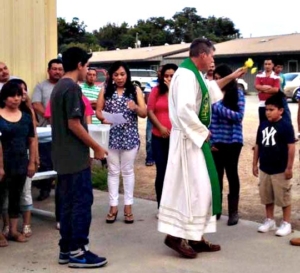You Can’t Out-poor the Delta
“We’re bringing our missionary skills home to a part of America that has an immense need.”
 Local Superior Father Patrick Keyes is one of four Spanish-speaking Redemptorists that make up a mobile team sent last fall to the Mississippi Delta. The Redemptorists’ ministry seeks to bring more Hispanic Catholics into the loving arms of the Catholic Church. The Delta’s Hispanic community has traditionally been underserved and poor.
Local Superior Father Patrick Keyes is one of four Spanish-speaking Redemptorists that make up a mobile team sent last fall to the Mississippi Delta. The Redemptorists’ ministry seeks to bring more Hispanic Catholics into the loving arms of the Catholic Church. The Delta’s Hispanic community has traditionally been underserved and poor.
While it’s estimated as many as 40,000 Hispanics live in the Delta—the bulk of them baptized as Catholic—the local churches have only a small Hispanic attendance. “Our goal is to empower the local people to take ownership of their faith and their own local faith community,” explained another member of the team, Fr. Ted Dorcey.
The Redemptorists minister to the Hispanics across in the 24 established parishes across the Delta. The need is high, as only three of the local priests are comfortable reading the Mass in Spanish, and none are able to preach in Spanish.
Fr. Patrick noted that the Redemptorists strive to live up to the vision of St. Alphonsus Liguori, the Italian priest who founded the Redemptorists in 1732. “His idea was that there were too many priests in the cities. He wanted to go to rural areas. So now we’re out here. It’s a rewarding calling to connect people with their God and their faith.”
According to the locals, the Delta extends from the lobby of the Peabody Hotel in Memphis to Catfish Row in Vicksburg. This rural region is composed of 17 agricultural counties in the flood plain of the Mississippi and Yazoo rivers. With top soil estimated to be eight feet deep, the Delta has some of the richest soil in the world. Yet the area is historically considered one of the most economically and educationally deprived areas of the nation. The Mississippi Delta is the poorest region of the poorest state in the US. “It is said that you can’t ‘out-poor’ the Delta,” Fr. Patrick commented.
Back in the mid-1800s, slavery was still a sad reality in the United States. African-American slaves were brought in to clear the rich soil, build a system of levees and begin to tame the land so cotton could be planted.
The legacy of slavery and the unequal distribution of wealth still haunts the Delta. The average income in the area is less than half of the US poverty line. More than 20% are reliant on food stamps, and the unemployment rate is 17%, more than twice the national rate. The area suffers from low rates of education, and public schools have a high school drop-out rate of 75%. High rates of obesity and diabetes have led to drastically shortened life-expectancies.
Persistent poverty has led to high levels of emigration. The one exception is the Hispanic population, which has doubled over the past 10 years. Due to the difficult terrain and hidden housing units in many rural areas, the Hispanic population has remained in the shadows.
The Redemptorists are working to create vibrant, sustainable Hispanic communities where the Gospel is proclaimed and the liturgy is celebrated well. They continue to develop the lay leaders in the Hispanic communities while local pastors study the Spanish language and culture. There are currently only 11 priests in the Delta, four of whom are past the age of retirement. Considering the likelihood of even fewer ordained ministers in the future, the Redemptorists are busy training liturgical ministers and catechists.
The Redemptorist community lives in a converted garage and two-bedroom apartment on a piece of land along the Tallahatchie River outside Greenwood. A family has begun developing the property into a Catholic retreat center. The men pray together each morning and celebrate Mass every day in a small private chapel. They take turns cooking, and gather for evening prayer after supper.
The other members of the team who work alongside Fr. Patrick and Fr. Ted are Fr. Scott Katzenberger and Fr. Thanh Nguyen. The priests have so far been well received. “We don’t go hungry,” Fr. Ted smiled. “We’ve been warmly welcomed.”
“The people of the Delta are people of great faith,” Fr. Patrick noted. “People here generally don’t ask strangers where they work – they ask where they attend church.”
The Delta ministry is a daunting task, but St. Alphonsus is surely applauding this new initiative. “In the people we minister to, we see the shepherds of Scala, the children of Warsaw and the immigrants of Philadelphia. No one needs to ask where the poor and abandoned are in the Delta,” Fr. Patrick concluded.
We’d like to acknowledge The Greenwood Commonwealth’s Editor and Publisher Tim Kalich who graciously granted permission to publish portions of Bob Darden’s September 8, 2014 article “Priests Adjusting to the Delta,” for this story.
